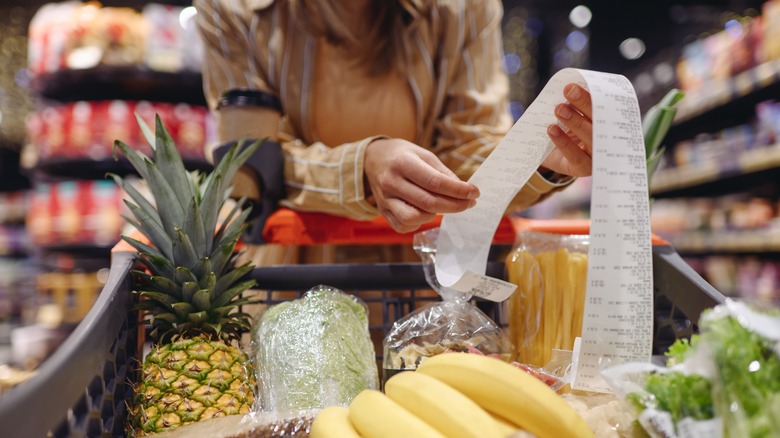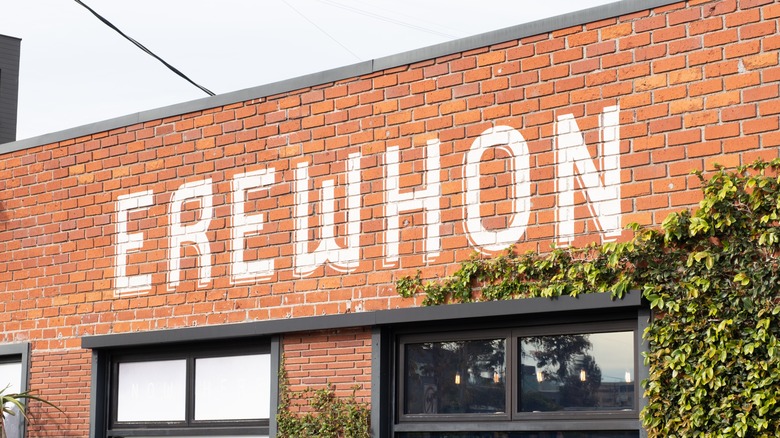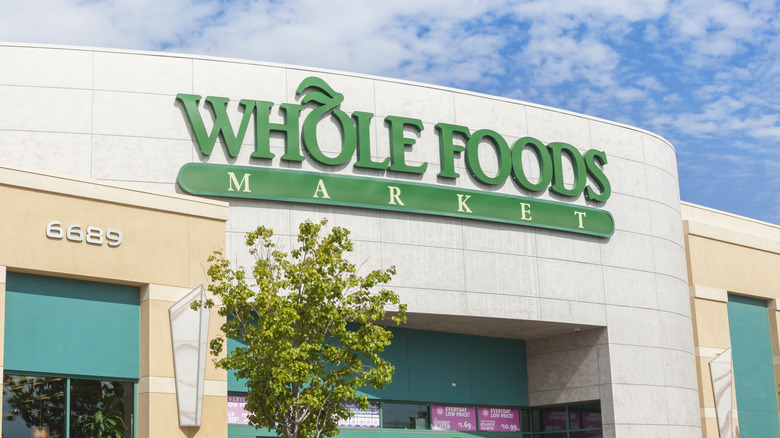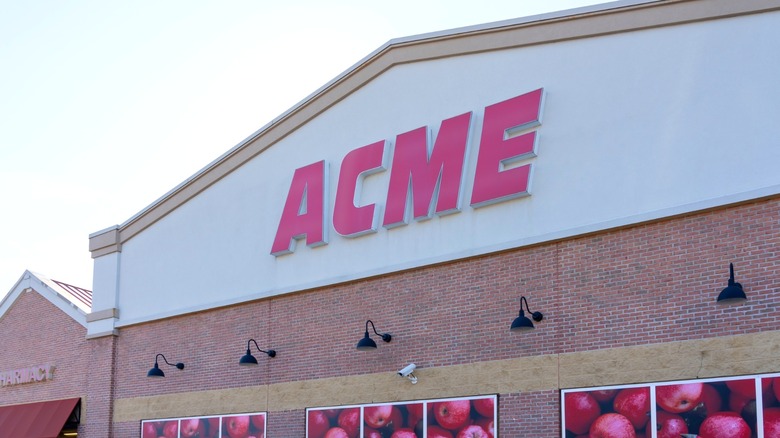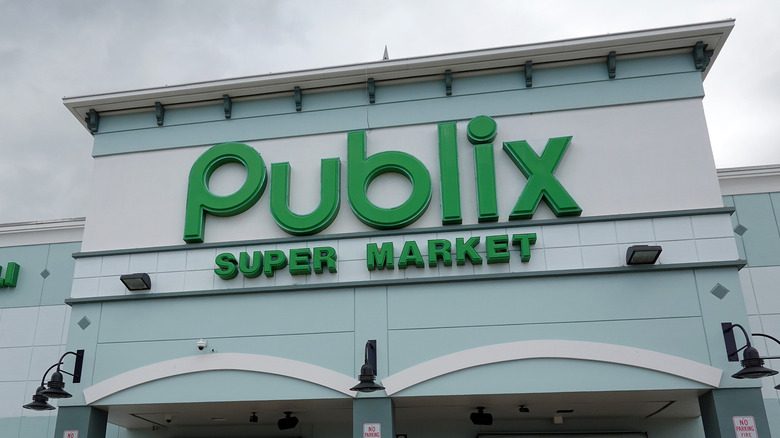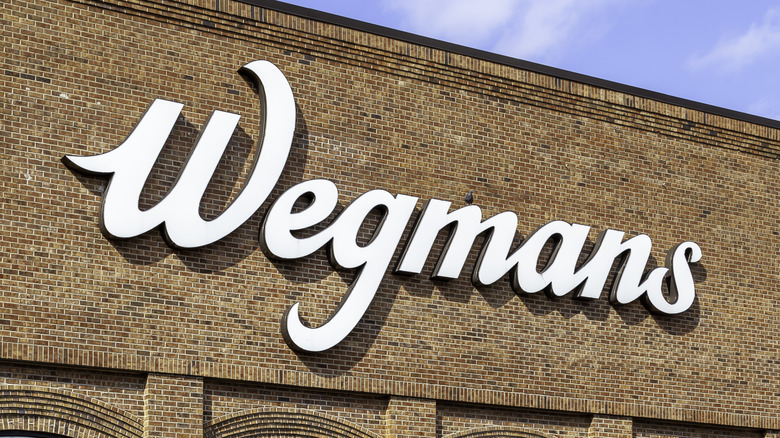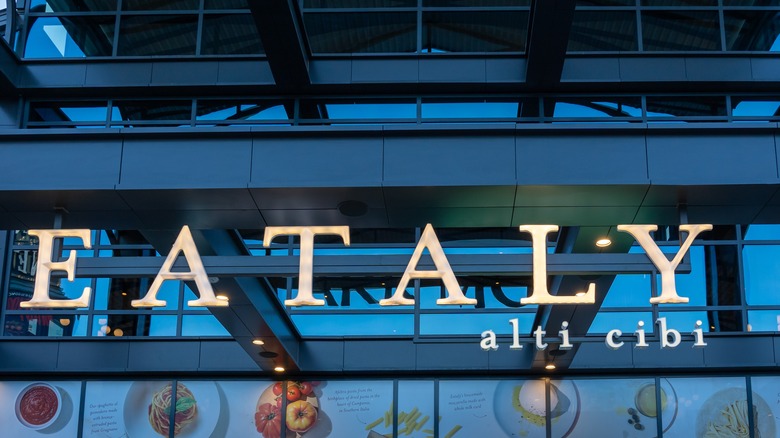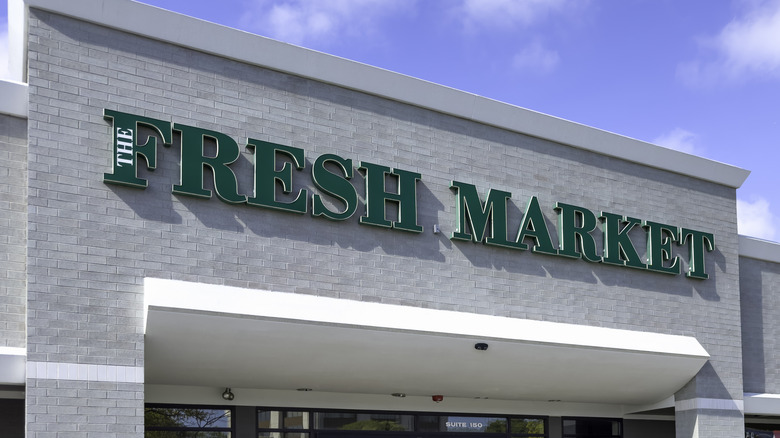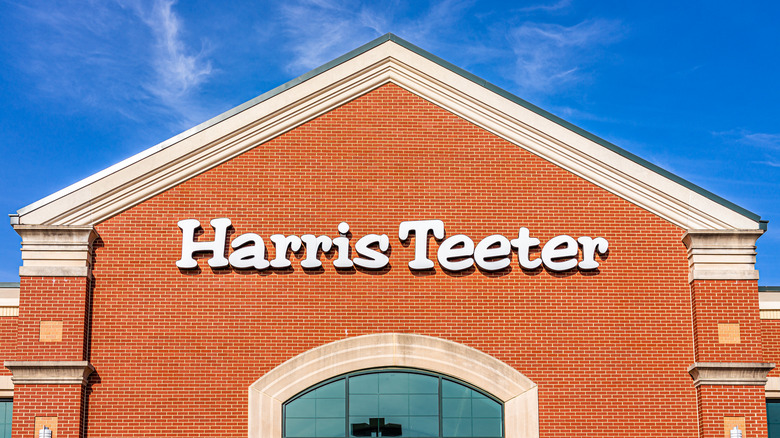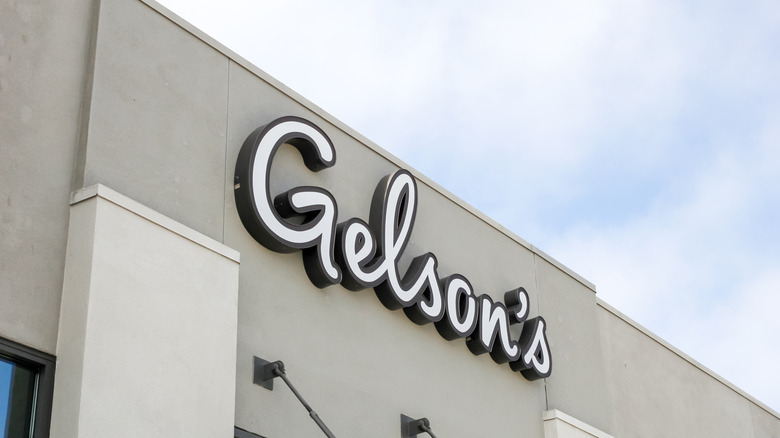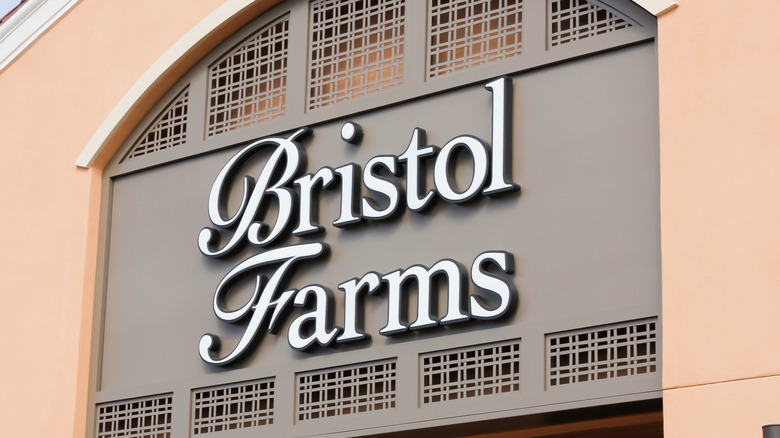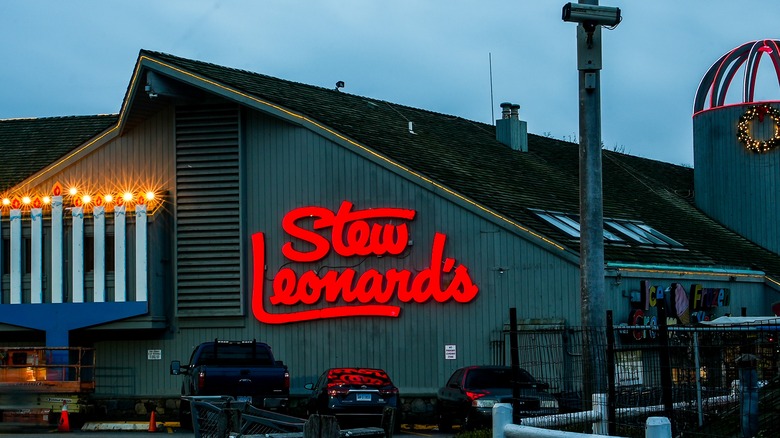11 Of The Most Expensive Grocery Store Chains In America
If your last grocery bill made you cringe, you are certainly not alone. And if you're worried about your next bill, you're not alone, too. According to a recent survey by LendingTree, 88% of American shoppers are rethinking their grocery habits because of inflation, tariffs, and other factors contributing to rising grocery prices. It's rough out here.
But not all grocery prices at each store are created equal at all. While grocery costs have risen across the board at all spots, some stores are truly in a league of their own. From $9 milk to $30 pasta (yikes), these specialty and gourmet grocers are redefining what "everyday shopping" means. If you are balling on a budget and trying to keep your grocery bill as low as possible, there are definitely some stores you may want to avoid. Here is a look at some of the priciest grocery store chains in America.
Erewhon Market
From the trending $19 strawberry to the iconic $19 Hailey Bieber smoothie, Erewhon Market has earned a reputation for boasting some of the most expensive groceries in the country. But while it's now known as a trendy Los-Angeles-based luxury grocery store, Erewhon had much humbler beginnings.
The upscale store began thousands of miles away in Boston. Founded in 1966 by Aveline and Michio Kushi, Erewhon started out as a small market focused on selling natural foods. While health and wellness are all the rage today, it was one of the first natural food markets at the time.
Fast forward a few decades, and Erewhon has completely transformed. The LA storefronts have become a hotspot for celebrities and influencers. And with A-list clientele usually comes A-list prices. Some TikTok users have even created videos mocking the store's heavy price tags, like $18.50 for almonds or $42.99 for a simple bottle of extra virgin olive oil. While Erewhon may be a fun place to go sightseeing on your next trip to LA, considering how much it costs to shop there, it's safe to say it isn't exactly where the average person may be heading for their weekly grocery run.
Whole Foods Market
Founded in 1980 by John Mackey, Renee Lawson Hardy, Craig Weller, and Mary Skiles, Whole Foods Market is a modern-day grocery staple. With a whopping 532 stores across the United States, it's one of the largest chain on today's list. Although it was founded in Austin, Texas, Whole Foods Market has expanded nationwide, with only six U.S. states currently — Alaska, Delaware, North Dakota, South Dakota, Vermont, and West Virginia — lacking a location.
Whole Foods Market is known for its focus on natural and organic products. It even has a strict list of quality standards that every item must meet to earn a spot on its shelves. Of course, that level of quality comes at a price. Whole Foods Market has a long-standing reputation as one of the country's most expensive grocery stores, earning its association with the phrase "whole paycheck." According to The Grocery Store Guy, its prices are about 10% to 20% higher than competitors, depending where you're located in the country.
When Amazon acquired Whole Foods Market in 2017, the company promised to make prices "affordable for everyone." While prices have dropped slightly, Whole Foods Market groceries still cost about 12% to 13% more than other grocers. Amazon did roll out nationwide discounts for Prime members, but with memberships costing $139 per year, that kind of investment may not be worthwhile unless you shop there regularly.
ACME Markets
ACME Markets is one of the oldest grocery chains on today's list, with roots that trace all the way back to 1891. It was founded by Samuel Robinson and Robert Crawford who initially set out to open a store simply for the Philadelphia neighborhood they lived in. By 1917, however, the store grew in size, merging with four others to form the "American Stores Company" or "ASCO." The name that many know today, ACME, didn't come to fruition until 1937.
Today, ACME operates 159 locations in six East Coast states: Connecticut, Delaware, Maryland, New Jersey, New York, and Pennsylvania. While ACME describes its prices as "competitive," customers may have a few other words to describe them. Reports from Consumers' Checkbook claimed that the chain is one of the highest-priced in the Delaware Valley area.
But according to customers, the quality of the products don't justify the cost. Consumers' Checkbook reported that ACME got the lowest ratings amongst surveyed customers, along with Walmart. Not exactly glowing reviews.
Publix
A trip to Florida is basically synonymous with a trip to Publix. But the beloved Southern grocery store also boasts some pretty high prices, earning it a spot on today's list.
Publix was founded in 1930 by George Jenkins. And Jenkins was no stranger to the grocery world as he held a job at Piggly Wiggly, the chain credited as the world's first supermarket, prior to opening up a store of his own. While Publix started out as a "food store," it transformed into a larger supermarket just 10 short years later. Today, Publix has over 1,400 locations across eight U.S. states, including Alabama, Florida, Georgia, Kentucky, North Carolina, South Carolina, Tennessee, and Virginia.
While its reach has increased, so have its prices. Back in 2022, Floridian customers noted that egg prices were more than double at Publix as compared to Target. And it didn't stop there. Customers also noted that milk prices were up 50%. Although egg prices are pretty much astronomical these days (with some of us questioning whether it would be more affordable to buy the actual chicken), Publix prices still stand out compared to its competitors.
Wegmans
Despite advertising "consistent low prices," Wegmans has some price tags that can make you do a double take. The chain was founded over a century ago in 1916 by John Wegman under a different name: Rocher Fruit & Vegetable Company. Today, the company has become a full-fledged supermarket with over 110 locations across eight states, including Delaware, Maryland, Massachusetts, New Jersey, New York, North Carolina, Pennsylvania, Virginia, as well as Washington D.C.
According to Consumers' Checkbook, Wegmans' prices often surpass those at ACME and are more in line with ones you'd find at Harris Teeter or Whole Foods Market. Still, many Northeastern shoppers are happy to pay the extra dollars, widely praising the chain for its high quality items and positive vibe of the chain.
Eataly
Unlike most grocery stores on today's roundup, Eataly isn't totally a supermarket. It offers more of a gourmet experience, disregarding big brands and serving up specialty food items like extra virgin olive oil, tomato sauce, and pasta straight from Italy.
Founded in 2007 by Oscar Farinetti in Torino, Italy, Eataly is one of the more recent additions to the grocery world. But despite its relatively young age, it's still managed to make a global splash. Today, the brand has 40 locations worldwide, with 10 located in the United States.
Farinetti's intention was to create something beyond your typical market. Every Eataly location is different but similar, which is part of its charm. Each Eataly location contains not only an Italian food store, but restaurants, as well, elevating customers' experience with the chain. In some, you can even find flower markets, fish mongers, and coffee bars. But, of course, with that elevated experience comes elevated prices. While you can get a box of Barilla pasta for just a couple dollars at your local supermarket, Eataly's shelves are stocked with pasta that ranges anywhere from $7.99 to $33.99. If you're looking to whip up a quick spaghetti dinner, Eataly may not be the be the best place to shop money-wise. But if you want to bring a taste of Italy into your home no matter the cost, head to Eataly.
The Fresh Market
The Fresh Market was founded by Ray and Beverly Berry who drew inspiration from the outdoor European food markets they encountered during a trip to Europe. With a desire to bring their experience to the States, the couple opened The Fresh Market in Greensboro, North Carolina in 1982. Today, the chain has expanded to 164 locations across 22 states.
But The Fresh Market isn't your average grocery store — at least according to CEO Larry Appel who describes the chain as more of a "speciality store." And considering the offerings, it's easy to see why. The chain prides itself on its vast selection of produce, imported food products from around the world, freshly-cut flowers, and hand-trimmed meats. Appel goes as far as to describe a shopping experience at The Fresh Market as a "treasure hunt," with the chain claiming to offer unique foods their customers can't find just anywhere.
Of course, treasure doesn't come cheap. A gallon of whole milk at The Fresh Market can cost $8.99 — more than double the national average of $4.02, according to the U.S. Bureau of Labor Statistics. Don't even get us started on the fact that the organic version is priced at $11.19. And unless you catch a good sale, ground beef could cost $7.99 per pound, a bit pricier than the national average of $5.79 per pound. At those prices, these specialty items may be best left for special occasions.
Harris Teeter
Harris Teeter is a Southeastern grocery chain known for the high quality of its groceries. Founded in 1960 by W.T. Harris and Willis Teeter in North Carolina, the chain now possesses 261 locations across eight states.
But it seems "high quality" is also code for expensive. According to Adam Wood of Revenue Geeks, Harris Teeter just might be the second most expensive grocery store in the country. Some loyal customers point fingers at the 2014 shift in ownership to Kroger Co. for an increase in prices, but, in reality, Harris Teeter was never exactly a bargain brand to begin with.
Still, it is easy to see why the chain remains a favorite among many. Its prepared food section is comparable to Whole Foods Market (yup it's that good), the chain has a mascot — Harry the Happy Dragon — who hands out free cookies (intended for kids but who's watching?), and VIC card holders (the store's free membership program) can score some pretty good discounts. So is Harris Teeter pricey? Sure. But compared to some other pricey chains on this list, at least this one comes with a cookie.
Gelson's
Move over Erewhon: There's a new sheriff in town. Southern California is no stranger to upscale grocery store options. And this next store is proof. With 27 locations across the state, Gelson's is another one of the Golden state's luxury grocery stores.
The story of Gelson's begins back in the 1930s when brothers Eugene and Bernie Gelson made the move from Iowa to Los Angeles. By 1951, the brothers opened their first supermarket in Burbank. While Gelson's initially prided itself on its premium produce and meats, today the chain also offers prepared meals ready for customers to take home and enjoy.
But don't expect Costco food court hot dog prices here. Meals typically range from $15 to $25. And, sure, that may not raise any eyebrows for a restaurant bill, but for a grocery store? That's definitely on the steeper side.
Prepared food aside, what really cements Gelson's as a luxury grocer are the fancy items stocked on the store's shelves. The chain sells a variety of grocery items in the "luxury" category and is one of the only grocers on this list (besides Erewhon) where you can buy Wagyu beef. It's definitely not the store you might want to run to if you're hoping to throw a couple of steaks on the grill.
Bristol Farms
Next up on our list is Bristol Farms which was launched in none other than (drumroll please)... California. Shocking, we know. Bristol Farms is yet another pricey SoCal grocery store to make today's list. Founded in 1982 by Irv Gronsky and Mike Burbank, the first location opened in Rolling Hills, California. Compared to some other stores on this list, Bristol Farms is on the smaller side, with just 13 locations under its belt.
Still, despite its size, it's certainly made a big impact on Southern Californians and has become a favorite among many. The chain is known for its high-quality meat and seafood selections, along with a top-notch prepared foods section. If you're chronically online, you may have already heard about its cookies. The Cookie (yes — that's its real name) is priced at $4 which sounds kind of outrageous until you realize it's basically the size of your head. Achieving social media virality is a pretty impressive feat for a chain with just 13 locations, proving that while Bristol Farms might be small, it's certainly mighty.
Stew Leonard's
If you've ever stepped foot into a Stew Leonard's, you know that a grocery trip there isn't like running your average errand. With animatronic characters, singing displays, and an almost carnival-like atmosphere, it's no surprise that The New York Times dubbed it the "Disneyland of Dairy Stores."
Founded in 1969, Stew Leonard's began as a dairy store where kids could watch milk being bottled while their parents shopped for groceries. While the chain has expanded since then, it is still the smallest chain on today's list, with just eight locations — all of which are in Connecticut, New Jersey, and New York.
Though Stew Leonard's is undeniably fun, those price tags are not so fun. As a specialty store, the chain only stocks 2,200 items (a lot less compared to the 30,000 you'll typically find in a standard supermarket) and are sticklers for quality and freshness. The narrow and curated item selection comes with a heftier price tag, especially as compared to its regional competitors (although it's not quite in Whole Foods Market territory). Still, if you find yourself in the tri-state area and want high-quality groceries with a side of entertainment, Stew Leonard's is definitely worth a visit.

